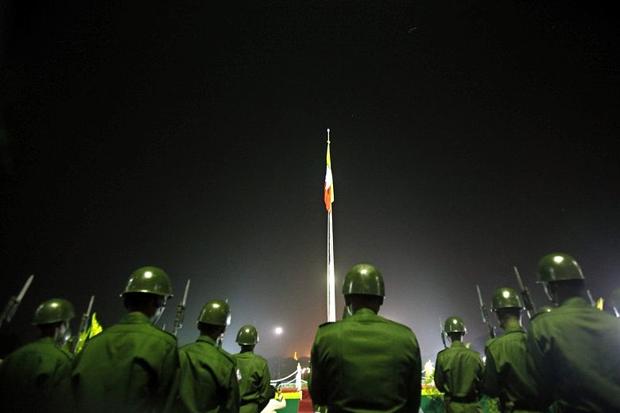21-27 April: More Transparency Required Regarding Burma Army’s Operations
April 29, 2014As documented on countless occasions by many local and international groups, the Burma Army has long been committing serious human rights abuses in ethnic areas of Burma, especially recently in Kachin State. Such abuses include waging war against civilians, summary executions, torture and mutilations, rape and other sexual violence against women, men and children, arbitrary detention, destruction of homes and property, and the blocking of humanitarian access. Such abuses terrorise local populations, undermine trust and confidence in the current peace process, and are illegal under international law. Furthermore, many of these human rights abuses could also be classified as war crimes or crimes against humanity.
In January, Burma Campaign UK commented on the fact that the British government was providing training to the Burma Army against this backdrop of ongoing and grave human rights abuses. According to Burma Campaign UK, at that point the British Ministry of Defence had spent £87,850 (almost US$150,000) on training the Burma Army without setting any preconditions relating to improving human rights or supporting democratic reform, and despite calls from many local groups to withhold such training.
What’s more, Burma Campaign UK has recently had to file an official complaint with the UK Information Commissioner in connection with the total failure of the Ministry of Defence to respond properly to a Freedom of Information request regarding the nature of the training that it has provided to the Burma Army. According to Burma Campaign UK, the Ministry of Defence has resorted to various tactics, including appeals to “commercial confidentiality”, delays which contravene its own internal rules, and a good old-fashioned cold shoulder.
Yet the British government has claimed that all training relates to human rights and governance. In which case, the refusal to provide information about the training is strange to say the least. Delays, dismissals and obfuscations will only encourage observers to conclude that there is more to it than the British government claims. Genuine transparency regarding such activities would enable all concerned parties – from Burma civil society organisations to British taxpayers – to make an informed decision as to whether British military support is helping or not; whether it is improving the human rights situation in places like Kachin State, or making it worse. However, judging from the recent upsurge in aggression in Kachin State, at the very least it seems to be acting as a fig leaf for continued attacks on civilians.
Moreover, only a few days ago, at the UN Security Council, Secretary-General Ban Ki-moon called upon the Burma government to “to fully investigate and respond to current and historical human rights violations and abuses, including crimes of sexual violence”. The Women’s League of Burma welcomed the report, which highlights the need for constitutional reform to bring the Burma Army under civilian oversight. However, other organisations have said that it is time for an independent UN investigation rather than yet another flawed, corrupt and non-impartial internal investigation.
Again, transparency is the key. Without transparency, everyone is kept in the dark, with growing fear, suspicion and doubt undermining the democratic reforms that have taken place thus far. It is vital that the Burma Army earns the trust of the people by taking whatever steps are required to secure peace, democracy and prosperity throughout Burma. However, it can only do so by being transparent about its operations and, in being transparent, by changing its approach. By the same token, all relevant international players should support that process, by insisting on transparency and by upholding such values themselves. Only with transparency can real progress be made towards a democratic and peaceful Burma whereby the army protects such reforms rather than undermining them, and plays an important role in genuinely guaranteeing the security of all people in Burma.
News Highlights
Inside Burma
Ten killed in recent fighting between Ta’ang National Liberation Army and Burma army in Shan State, and intense situation in Kachin State after recent outbreak of fighting leaves next round of nationwide ceasefire negotiation in doubt, while Kachin Independence Army leader requests US become involved in peace efforts in order to guarantee future minority rights
Burma sets to sign production sharing contracts for onshore energy exploration in May
Regional
International
EU begins talk with Burma over investment protection
Opinion
In Democratizing, Can Naypyidaw Follow Jakarta’s Lead?
By Saw Yan Naing
The Irrawaddy
Latest from the Blog
Burma Army Makes a Mockery of the Census and its Backers
By Burma Partnership
Actions
Demonstrators in Sagaing and Taninthayi regions call for amendment to the 2008 Constitution
100 demonstrators in Pegu region and dozens in Mon State call for the release of jailed DVB reporter
Statements and Press Releases
Burma Campaign UK Reports Ministry of Defence For FOI Breach Re Burma Military Training
By Burma Campaign UK
Thein Sein Must Release Nay Myo Zin and Win Cho
By Burma Campaign UK
UN Secretary General Calls For Investigation into Sexual Violence in Burma
By Burma Campaign UK
Children of Kachin Need Protection and Have a Right to Peace, Says UNICEF
By United Nations Children’s Fund
A Tribute to U Win Tin
By Human Rights Watch
A Tribute to U Win Tin, Burma’s Voice of Reason
By FIDH and ALTSEAN-Burma
Win Tin’s Fight for Press Freedom and Democracy Goes on
By Reporters without Borders
ကခ်င္ျပည္နယ္ႏွင့္ ရွမ္းျပည္နယ္ေျမာက္ပိုင္း နယ္ေျမမ်ားအတြင္း ျမန္မာ့တပ္မေတာ္က မဟာဗ်ဴဟာ ထိုးစစ္မ်ား ဆင္ႏြဲေနျခင္းအေပၚ ျပင္းထန္စြာ ကန္႕ကြက္ေၾကာင္း ထုတ္ျပန္ေၾကညာခ်က္
By United Nationalities Federal Council
WLB Welcomes UN Recognition of Burmese Government Failure to Address Ongoing Sexual Violence
By Women’s League of Burma
Reports
Conflict-related Sexual Violence: Report of the Secretary-General
By United Nations Security Council
This post is in: Weekly Highlights










 All posts
All posts